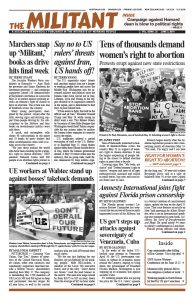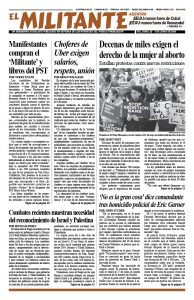June 6, 1994
EAST PEORIA, Illinois — In a victory for the United Auto Workers union, Caterpillar Inc. announced May 19 that it would reinstate 34 of 37 workers indefinitely suspended for union activities. Three workers remain suspended because the company alleges prior disciplinary problems.
“We kicked the company’s butt,” union committeeman Jim Sharpe declared as he and other workers returned to their jobs May 20 after a four-day strike. “We got what we needed to go back. In the shop or on the street we will continue to take the battle to them.”
“The bottom line is, solidarity works,” UAW Local 974 president Jerry Brown said in a statement to the press. “Our members were extremely disciplined on the picket lines. That’s what convinced Caterpillar that their threats and intimidation wouldn’t work.”
June 6, 1969
Explosive confrontations between Argentinian students and workers and the police and army escalated to a new level May 23 when both of the country’s major trade-union federations called a nationwide general strike in support of protests sweeping the country.
A general strike had already totally paralyzed Rosario, Argentina’s second largest city, May 22. The local labor movement called the strike in defiance of the martial law established in the city early that morning when the army moved in to quell mass protests against police brutality.
The outbreak occurred when police shot and killed a 15-year-old youth on the night of May 21 in the course of demonstrations protesting police shootings of two students the preceding week.
The unrest appeared to have spread far beyond the limits of previous opposition to the regime.
June 3, 1944
SEATTLE — An estimated 50,000 members of the AFL Lumber and Sawmill Workers are on strike throughout this Northwest Pacific area in a fast-spreading walkout against a War Labor Board decision denying the lumber workers the much-needed and much-promised wage increases they have been demanding since Pearl Harbor.
The Washington State Director of Selective Service stated that strikers are to be considered as “not working” and “naturally will be reclassified 1-A.” These threats have been followed by the further spread of the strike.
The lumber mills and camps are seething with resentment against the lumber kings and their WLB agents. Wages in this dangerous industry have remained virtually stationary despite price rises since the beginning of the war. Profits, however, have increased tremendously.

